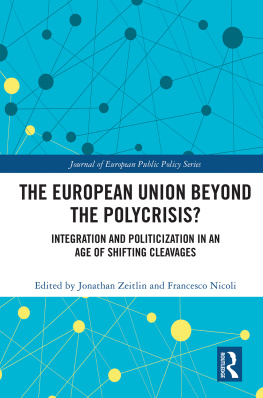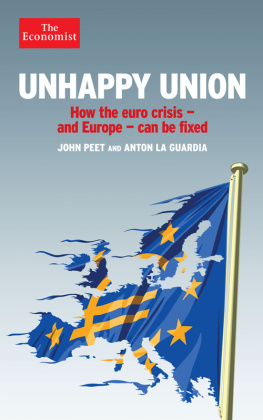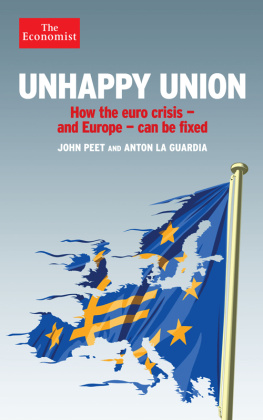The Choice for Banking Union
This book explains why the European Union (EU) Member States in response to the euro crisis agreed to establish banking union, despite previous objections, and why they chose its hybrid institutional design.
Analysing its establishment from 2012 to 2020, the book offers a comprehensive view of the preferences of the Member States and EU institutions, as well as of the negotiation dynamics and latest developments in the three pillars of banking union, namely, the Single Supervisory Mechanism, the Single Resolution Mechanism and the common backstop, and the European deposit insurance scheme. Furthermore, empirically, the book looks beyond the usual focus of the northern and southern coalition of states to underline the influence of powerful smaller Member States in the intergovernmental bargaining process. Adopting a range of theoretical perspectives, it questions the solidity of the northern versus southern camps and reveals distinctive and particular positioning from individual countries during the process.
This book will be of key interest to scholars and students of European financial market regulation, European economic governance, EU institutions, European integration theory and EU politics more broadly.
Elena Ros Camacho is Research Associate and Lecturer at the TUM School of Social Sciences and Technology of the Technical University of Munich (TUM), Germany.
Routledge / UACES Contemporary European Studies
Series editors: Chad Damro, University of Edinburgh, UK,Elaine Fahey, City University London, UK, and David Howarth, University of Luxembourg, Luxembourg, on behalf of the University Association for Contemporary European Studies.
Editorial Board: Grainne De Brca, European University Institute and Columbia University; Andreas Fllesdal, Norwegian Centre for Human Rights, University of Oslo; Peter Holmes, University of Sussex; Liesbet Hooghe, University of North Carolina at Chapel Hill, and Vrije Universiteit Amsterdam; David Phinnemore, Queens University Belfast; Ben Rosamond, University of Warwick; Vivien Ann Schmidt, University of Boston; Jo Shaw, University of Edinburgh; Mike Smith, University of Loughborough and Loukas Tsoukalis, ELIAMEP, University of Athens and European University Institute.
The primary objective of the new Contemporary European Studies series is to provide a research outlet for scholars of European Studies from all disciplines. The series publishes important scholarly works and aims to forge for itself an international reputation.
European Sovereignty, Legitimacy, and Power
Bart M.J. Szewczyk
Parliamentary Agency and Regional Integration in Europe and Beyond
The Logic of Regional Parliaments
Bruno Theodoro Luciano
The Choice for Banking Union
Power, Politics and the Trap of Credible Commitments
Elena Ros Camacho
The Politics of Legitimation in the European Union
Legitimacy Recovered?
Edited by Christopher Lord, Peter Bursens, Dirk De Bivre, Jarle Trondal and Ramses A. Wessel
For more information about this series, please visit: www.routledge.com/Routledge-UACES-Contemporary-European-Studies/book-series/UACES
The Choice for Banking Union
Power, Politics and the Trap of Credible Commitments
Elena Ros Camacho

First published 2022
by Routledge
2 Park Square, Milton Park, Abingdon, Oxon OX14 4RN
and by Routledge
605 Third Avenue, New York, NY 10158
Routledge is an imprint of the Taylor & Francis Group, an informa business
2022 Elena Ros Camacho
The right of Elena Ros Camacho to be identified as author of this work has been asserted in accordance with sections 77 and 78 of the Copyright, Designs and Patents Act 1988.
All rights reserved. No part of this book may be reprinted or reproduced or utilised in any form or by any electronic, mechanical, or other means, now known or hereafter invented, including photocopying and recording, or in any information storage or retrieval system, without permission in writing from the publishers.
Trademark notice: Product or corporate names may be trademarks or registered trademarks, and are used only for identification and explanation without intent to infringe.
British Library Cataloguing-in-Publication Data
A catalogue record for this book is available from the British Library
Library of Congress Cataloging-in-Publication Data
A catalog record has been requested for this book
ISBN: 978-0-367-72187-9 (hbk)
ISBN: 978-0-367-72196-1 (pbk)
ISBN: 978-1-003-15381-8 (ebk)
DOI: 10.4324/9781003153818
Typeset in Times New Roman
by Newgen Publishing UK
Contents
Figures
Tables
Introduction
DOI: 10.4324/9781003153818-1
The financial and euro area sovereign debt crises (20082012) posed dilemmas that challenged Europes resilience by exposing deep structural flaws in the design of the Economic and Monetary Union (EMU) that had to be fixed for it to survive, creating strong pressures for reform. The international financial crisis, which first affected Ireland and later Spain, together with the domestic fiscal crises in Greece, Portugal and Italy, derived in a sovereign debt crisis, which became a Euro institutional crisis aggravated by the incompleteness and asymmetries of EMU as established by the Treaty of Maastricht in 1991.
Among the various reforms carried out at the onset of the euro area crisis, the establishment of the European Banking Union (EBU) represents the highest transfer of national sovereignty to the European Union (EU) level since the creation of EMU. The euro area sovereign debt crisis revealed that the banking systems of EU Member States were fragile, that the close link between domestic banks and the respective Member States reinforced financial risks, and that crises of domestic banking systems had contagious effects on other Member States, especially those of the Euro system. EBU constituted the EUs response to this problem. Banking Union is a widely used term to refer to the project of transferring banking-sector policy instruments from the national to the European level, but there is no official or legal definition of what it is or should be. It includes three pillars: The Single Supervisory Mechanism (SSM), the Single Resolution Mechanism (SRM) and common backstop, and the European Deposit Insurance Scheme (EDIS).
At the beginning of the global financial crisis in 2008, the European Commissions decision to allow national solutions to stability and growth reinforced national responsibility for bank recapitalization, namely public intervention and deposit insurance (, pp. 4446). The potential default of the Greek state in April 2010 threatened the financial stability of the countrys banks, which held large amounts of sovereign debt ( Howarth & Quaglia, 2016 , p. 36). As market tensions persisted and threats of contagion extended to the periphery of the euro area, Member States agreed to set up the European Financial Stability Facility (EFSF), a temporary entity with 440 billion, and the European Stability Mechanism (ESM), with a capacity of 500 billion, to provide financial support to troubled states. Subsequently, Greece was granted the EU-IMF financial support package with strict conditionality and an austerity reform package, which was supervised by the Troika institutions the European Commission, the European Central Bank (ECB) and the International Monetary Fund (IMF).













